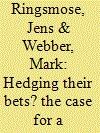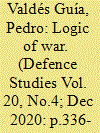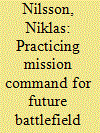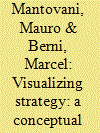|
|
|
Sort Order |
|
|
|
Items / Page
|
|
|
|
|
|
|
| Srl | Item |
| 1 |
ID:
175452


|
|
|
|
|
| Summary/Abstract |
In 2017, the Norwegian Ministry of Defence and the Norwegian Home Guard commissioned a research project to help set a future identity and direction for the reserve-based Home Guard. Using a combination of frameworks, we consider major threats against Norway and, in light of this analysis, suggest a future identity and direction. Our analysis says that, while conventional warfare still poses the most difficult challenge to the country, irregular warfare can be harder to defend against, in that it is often covert, non-attributional, directed at the civilian sector and in the grey zone between war and peace. Limited situational understanding, limited civilian–military coordination, and a limited ability to deal with situations over time contribute to this. We conclude that the Home Guard has the potential to contribute to increased national resilience, in that it has local anchoring, a distributed structure to provide flexible support and the ability to cooperate with civilian organizations. The combined framework we introduce in this paper can be employed to conduct a variety of defence analyses in a coherent fashion, increasing the credibility, transferability, dependability and confirmability of such analyses.
|
|
|
|
|
|
|
|
|
|
|
|
|
|
|
|
| 2 |
ID:
175446


|
|
|
|
|
| Summary/Abstract |
President Donald Trump has adopted a critical position on NATO, raising concerns of an American abandonment of its obligations to Europe’s defence. The severity of Trump’s position is unusual, but some of his concerns are of long-standing and likely to be voiced in some form by his successor in the White House. American criticism and equivocation has led the European allies to engage in various forms of hedging. Some of these strategies are designed to keep the US attached to NATO; others bypass the alliance – cultivating either bilateral links to the US or a strengthening of EU defence cooperation. Hedging, whatever its form, is potentially damaging to alliance effectiveness and cohesion. In that light, NATO’s interests are better served by a strategy which builds upon the NATO-EU relationship and which advertises the benefits of European effort within NATO itself. To that end, we argue in favour of a reformulation of an old but much misunderstood idea – that of NATO’s “European pillar.” Here, existing contributions to European defence provided by the allies through NATO are crucial. Such an arrangement need not, therefore, entail any elaborate institutional engineering, but it does require political and strategic clarity.
|
|
|
|
|
|
|
|
|
|
|
|
|
|
|
|
| 3 |
ID:
175448


|
|
|
|
|
| Summary/Abstract |
At the origin of every war is an existential conflict and a recourse to violence that opens the “ontic” door of the enemy to transform him. Judgement corresponds to political logic, and violent existential transformation to the logic of war, which is engendered in that political matrix throughout the duration of hostilities. The objective nature of that logic structures the rationale of the theatre in terms of “performative” praxis, with two inseparable aspects: a violence that while destroying one order imposes an alternative one. The subjective nature of that logic is generated in its political matrix throughout the duration of the conflict, determining, in a dynamic way, its most basic formalization. Since war is engendered in politics, it adopts its character, a subjective nature that leads it to seek a peace treaty or a victory. In short, when the war begins, the political totality of each one of the belligerents starts to incorporate a new situation and, therefore, two logics coexist: one engendered in the other, and both conditioning each other. The symbiotic relationship between these two rationalities does not allow politics to dominate it according to the parameters of an instrumental reason.
|
|
|
|
|
|
|
|
|
|
|
|
|
|
|
|
| 4 |
ID:
175453


|
|
|
|
|
| Summary/Abstract |
As armies across Europe are currently developing capabilities to fight a high-intensity conventional war against a peer adversary, these armies will have to develop units that can fight independently in a complex environment, with limited direction from higher levels of command. Integral to this process is the need for a competent practice of mission command, viewed as a key component of maneuver warfare. The article identifies a set of enablers that need to be present in a military organization in order to practice mission command efficiently, including shared understanding and trust; initiative; a tolerant approach to failure, success, and learning; and the acceptance of mission command as an all-encompassing practice. The article then presents data from interviews with Swedish army officers focusing on the presence and significance of these enablers in their professional context. The article concludes that the increasing complexity of the peacetime tasks performed by military officers give rise to conflicting leadership demands. Consequently, exercising mission command and socializing younger colleagues into the practice is a far from straightforward process, which frequently competes with other demands placed on officers by their colleagues, the organization that they are part of, or the broader societal context.
|
|
|
|
|
|
|
|
|
|
|
|
|
|
|
|
| 5 |
ID:
175451


|
|
|
|
|
| Summary/Abstract |
The theoretical framework of complexity is beginning to attract wider attention in research on the armed forces, and consequently the views of those who face complexity on the ground should be explored in more detail. Failure to do so risks complexity remaining only a top-level theory lacking adequate connection to practice. This article seeks to address this issue through analyzing the views of Finnish military officers. Data for the research were gathered using a deliberation and data collection method called a security café. A total of 74 people, most of them holding the rank of captain in the army or air force or lieutenant senior grade in the navy, attended the security café. The data used in this research were elicited from 47 idea rating sheets, evaluated during the security café, and include both quantitative and qualitative data. The article analyzes those data to address the following questions in relation to the theoretical framework of the article: What kind of perceptions of the complexity of the security environment do officers hold? What kind of practices do officers consider fit the presumed complexity of the security environment?
|
|
|
|
|
|
|
|
|
|
|
|
|
|
|
|
| 6 |
ID:
175449


|
|
|
|
|
| Summary/Abstract |
In spite of theoretical and methodological diversity, the three generations of the strategic culture literature failed to overcome the main challenge of the approach – to account for change in behavior – due to two fallacies: Conceptualizing strategic culture as homogenous on the national level and continuous on the temporal level. However, the recent emergence of fourth generation in the literature offers prospects for overcoming them. The article presents a new, falsifiable theoretical model that pursues this aim. Thus, it begins with discussion of the promise and pitfalls of the fourth generation. Next, the alignment of strategic culture with new institutionalism is explored. This is followed by an introduction of discursive institutionalism and its potential for advancing the fourth-generation theory building. Then, a new falsifiable fourth-generation discursive-institutionalist strategic culture model is presented. The concluding section discusses the operationalization of the model via network analysis using social data science methods.
|
|
|
|
|
|
|
|
|
|
|
|
|
|
|
|
| 7 |
ID:
175447


|
|
|
|
|
| Summary/Abstract |
The Islamic State (IS) ruled over 11 million people at the height of its power. It also orchestrated over 250 terrorist attacks against the West. Thus, by any measure, IS surpassed the ambitions held by its predecessor al-Qaeda. Yet the United States (US) did not deploy tens of thousands of troops to confront it. It instead used surrogate forces to evict IS from its strongholds. Drawing on interviews with senior policymakers, diplomats, and military officials with knowledge of Operations Inherent Resolve in Syria and Odyssey Lightning in Libya, this paper confronts commonly-held perspectives on the “by, with, through” approach to warfare. It argues that will-to-fight and skillset play important roles in US military partnerships with irregular forces. Nevertheless, these two characteristics alone cannot overcome interference by other nation-states. To be successful, these partnerships should either be limited to short-term objectives or the US and allied forces should be prepared to deter opposition to their surrogates over the medium-to-long term.
|
|
|
|
|
|
|
|
|
|
|
|
|
|
|
|
| 8 |
ID:
175450


|
|
|
|
|
| Summary/Abstract |
Few researchers have suggested models for visualising particular strategies applied during wartime. The authors present a new analytical, visual methodology for the conduct of war. It refines Arthur F. Lykke Jr.’s definition of strategy, which emphasises the interaction of three components: ends, ways and means. Moreover, the framework introduced distinguishes between military and civilian components, public declaration and action as well as use and reserve. Thus, a conceptual framework is offered to the scholarly community that aims to both analyse and visualise a party’s true strategy during an armed conflict and that is, moreover, applicable to both regular and irregular parties in a specific operational theatre. Furthermore, this methodology supports the teaching of strategic dimensions in an academic setting.
|
|
|
|
|
|
|
|
|
|
|
|
|
|
|
|
|
|
|
|
|